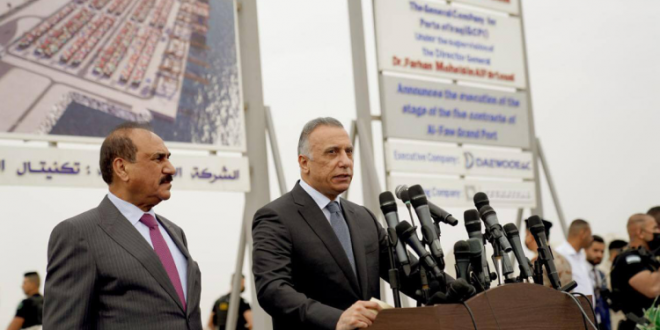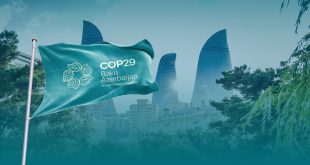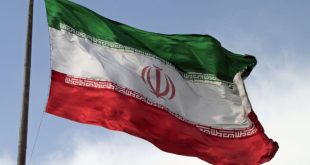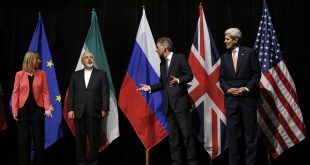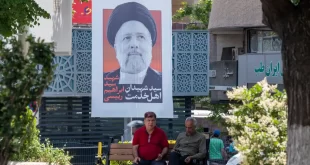In recent years, Iraq has become one of the leading destinations for Chinese investments in the Middle East and a crucial link in Beijing’s Belt and Road Initiative (BRI). To capitalize on its geostrategic location and central position within the Chinese BRI, Iraq is seeking to develop a sprawling new 54-square-kilometer port project in the far southern town of al-Faw, known as al-Faw Grand Port, which will reduce the country’s reliance on Arab Gulf ports and overland transit from Iran and Turkey for its imports. The project also underscores Iraq’s growing economic rivalry with neighboring Iran, as both countries seek to carve out a similar niche in handling regional transit traffic.
Iraq’s hurdles to development
A number of hurdles have hampered Iraq’s efforts to diversify its economy, including extreme underinvestment and widespread corruption. There are some signs that change may be on the horizon, however. Earlier this month, Baghdad reached an agreement with France’s TotalEnergies to move forward with a massive, long-delayed $27 billion energy project, highlighting the potential for foreign investment and partnerships to contribute to Iraq’s economic growth and development. This follows an earlier deal, announced in July 2021, between the Iraqi Ministry of Oil and China National Chemical Engineering Co. (CNCEC), whereby CNCEC will develop an integrated petrochemicals and refining complex at al-Faw capable of producing 300,000 barrels per day (bpd) of oil as well as, in a later second phase, 3 million tons per annum (mtpa) of petrochemicals.
International companies are increasingly showing interest in investing in Iraq’s energy and infrastructure sectors in particular. This could help to improve the country’s economic prospects and reduce its reliance on oil exports, which accounted for 95% of its federal budget revenue in 2022. The success of projects like these will depend on a range of factors, including security conditions, political stability, and the government’s ability to create a favorable investment climate.
On the corruption front, the case of Shakir al-Zamili has demonstrated that Iraqi courts can hold corrupt officials accountable for their crimes. In January 2022, the Criminal Court in Karkh sentenced Zamili to a four-year jail term for corruption during his tenure as head of Baghdad’s Investment Commission. Given the sheer scale and pervasiveness of corruption — one estimate put the total amount stolen between 2003 and 2020 at $250 billion — Iraq clearly has a very long way to go to address the problem.
Al-Faw: A future economic pillar
The al-Faw project includes the construction of a new port, dry dock, oil terminal, dry canal, and associated transportation infrastructure, and once completed, it is expected to become one of the main pillars of Iraq’s economy. According to recent reports, phase one is set to be finished in 2025 and will have the capacity to handle 20-45 mtpa of cargo. The dry canal will provide land connectivity to the Turkish border via road and rail, linking up with port and rail infrastructure in Turkey, especially in Mersin and Istanbul. If successfully completed, al-Faw could leverage its location and connectivity with Turkey and Syria to become a leading container terminal and one of the largest ports in the world.
In December 2022, Basra hosted the second al-Faw International Conference, the focus of which was to highlight the al-Faw port and dry canal. Iraq’s central goal is to link this project with China’s broader BRI and bill it as part of an alternative route to the Suez Canal and the North-South Corridor. China’s overall investment in the Middle East, North Africa, and Turkey between 2005 and 2022 totaled $273 billion. Iraq has become an increasingly important partner for China in recent years, with a particular focus on the energy sector. Beijing inked deals with Baghdad worth $10.5 billion in 2021 alone. Chinese companies have secured contracts to develop and operate several major oil and gas assets, including the Rumaila and Halfaya oil fields. Chinese firms have also been involved in building and operating power plants and other infrastructure projects in Iraq, in addition to investing in telecommunications and agriculture. China’s investments have contributed significantly to Iraq’s economic development and have strengthened economic ties between the two countries.
Iran’s missed opportunities and new challenges
The focus on al-Faw and China’s investments in Iraq has also underscored neighboring Iran’s limited role in international transit and trade, an area in which Tehran punches far below its weight. Given its central location and status as a landbridge between South and Central Asia and the Middle East, Iran should play a major role in both the East-West and North-South corridors — the former connects the Caucasus, Central Asia, and China to the Middle East and Europe via Iran, while the latter links Russia and Central Asia to the Persian Gulf and India through Iran — but Tehran has not capitalized on either opportunity. Despite its natural advantages, Iran has failed to become an important strategic hub for the transportation of goods due to a combination of factors, including economic sanctions, political instability, and outdated transportation infrastructure, especially for railways and ports.
The development of al-Faw Port in Iraq could represent a further challenge to Iran’s aspirations in this area. Ali Hosseini, the head of the Transport and Logistics Commission of the Iran Chamber of Commerce, believes that, in the future, al-Faw will become a major competitor for Iran. With help from Turkey and the UAE, Iraq is trying to link al-Faw to Iraq’s national railway and connect that railway to Turkey in the north, creating an alternative transportation corridor that will likely have a negative impact on Iran’s transit traffic to Turkey.
At present, an estimated 90% of transit traffic through Iran moves by road. While there is an existing railway between Iran and Turkey, it is limited and often disrupted by political tensions between the two countries. The volume of trade between Iran and Turkey is significant, reaching $6.42 billion in 2022, up from $5.59 billion the year before, but the lack of reliable transportation infrastructure has hindered its growth.
Officials in Tehran have accused the United States of interference and suggested that Baghdad is under pressure from Washington to impede Iran’s development of a viable north-west transit corridor. They also claim that Turkey is exerting influence on Iraq to back its railway link to Asia, in line with Ankara’s ambition of becoming a regional hub for energy and communication. As a result, it is highly likely that Iran will use Iraq’s actions in this space as leverage in their bilateral negotiations over energy and agricultural trade, and this could potentially strain the relationship between the two countries in the future.
Regional rail connectivity
A new rail link is in the planning stages that will run from the Persian Gulf through Iraq to Turkey and eventually on to Europe. The project, which involves the construction of 1,200 kilometers of new electric railway lines, is part of the larger $7 billion Grand al-Faw Port development and could potentially serve as an alternative to the Red Sea/Suez Canal. The contractor for the project will be the French rail transport company Alstom. Previously, the Italian company PEG carried out feasibility studies and identified the appropriate route. Turkey and the UAE have provided financial support for the Iraqi segment of the project, which will have a significant impact on the local economy. If all goes to plan, by 2025, upon the completion of the al-Faw railway, Iraq will handle most of the rail traffic between the Gulf and Europe.
For Iran to compete with al-Faw Port and improve its overall connectivity, it needs to further develop its rail infrastructure. Potential opportunities include connecting Jask Port on the Gulf of Oman to Sarakhs on the Turkmenistan border and from there on to Central Asia via a railway corridor running through Iranshahr, Zahedan, and Mashhad, as well as linking the port of Chabahar to Shalamcheh along the Persian Gulf coast and then on to Basra. In particular, the latter could provide an alternative to plans to turn al-Faw into a gateway for goods destined for Europe.
Iran-Iraq competition
Iran has a number of major concerns about Iraq’s transit ambitions and its cooperation with China, from the potential weakening of its own position in the transit trade to the fact that the nearby Iranian port of Khorramshahr does not enjoy the same geopolitical position as al-Faw, all of which underscore Iran’s international isolation and the impact of sanctions.
Iran is particularly concerned that Iraq may potentially surpass it as a regional player in maritime transport. Tehran believes that Iranian ports should not have a smaller share of regional transit traffic than those of Iraq. The latter currently handle approximately 1.8 million twenty-foot-equivalent units (TEUs), while container throughput at Iranian ports totaled 2.1 million TEUs during the last Iranian year ending on March 20, 2022, up 13.5% year-on-year. While experts are bullish on Iran’s potential capacity for handling regional transit traffic, estimating it at up to 200 mtpa, the current volume is far lower, at less than 10 mtpa.
At present, Iran’s transportation, port, transit, and logistics sectors are being held hostage by politics and the impact of geopolitical tensions and international sanctions. Until this changes, Tehran’s efforts to develop and expand these sectors will be hindered and it will be unable to achieve its potential as a regional leader in transportation and trade.
Looking ahead
The al-Faw Port project provides several opportunities for Iraq to strengthen its role in regional transit and its geopolitical position more broadly. To do so, it will first have to address both internal challenges, like corruption and political divisions, and external challenges, such as investment competition between China and the United States. Looking across the region, projects like al-Faw seem to present a threat for some countries, like Iran, while likely benefiting others, such as Turkey, Qatar, and Syria. Despite the significant potential upside for Iraq, both economically and politically, the associated challenges will not be easy to overcome.
The competition between Iran and Iraq in regional maritime and overland transit corridors is indicative of the broader economic and political rivalry between the two countries. Iraq’s al-Faw Port mega-project represents a significant challenge to Iran’s efforts to develop Chabahar Port and establish itself as a regional transit hub. However, the competition between the two countries does not have to be zero sum, and both have much to gain from increased economic cooperation and integration. Ultimately, the success of these mega-projects will depend on a range of factors, including political stability, regional security, and the willingness of all stakeholders to work together to realize their shared goals.

